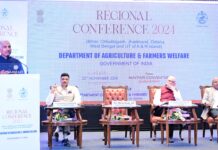By Our Correspondent
NEW DELHI/BHUBANESWAR: Union Minister of Petroleum & Natural Gas and Steel Dharmendra Pradhan in the Rajya Sabha in a written reply said that Ministry of Petroleum and Natural Gas is working in collaboration with various Central Government Ministries/State Governments/ stakeholders to make efforts to achieve reduction in import dependency on oil. The import reduction strategy broadly includes increasing domestic production of oil and gas, improving energy efficiency and productivity, giving thrust on demand substitution, promoting biofuels and using alternate fuels/ renewables.
Government has taken several steps to enhance exploration & production of oil and gas in the country which include; Policy for Relaxations, Extensions and Clarifications under Production Sharing Contract (PSC) regime for early monetization of hydrocarbon discoveries, Discovered Small Field Policy, Hydrocarbon Exploration and Licensing Policy, Policy for Extension of Production Sharing Contracts, Policy for early monetization of Coal Bed Methane, Setting up of National Data Repository, Appraisal of Unappraised areas in Sedimentary Basins, Re-assessment of Hydrocarbon Resources, Policy framework to streamline the working of Production Sharing Contracts in Pre-NELP and NELP Blocks, Policy to Promote and Incentivize Enhanced Recovery Methods for Oil and Gas, Policy framework for exploration and exploitation of Unconventional Hydrocarbons under existing Production Sharing Contracts, Coal Bed Methane contracts and Nomination fields.
The Government in February, 2019 approved major reforms in exploration and licensing policy to enhance exploration activities, attract domestic and foreign investment in unexplored/unallocated areas of sedimentary basins and accelerate domestic production of oil and gas from existing fields.
The policy reforms inter-alia, aims to boost exploration activities with greater weightage to work programme, simplified fiscal and contractual terms, bidding of exploration blocks under Category II and III sedimentary basins without any production or revenue sharing to Government, early monetization of discoveries by extending fiscal incentives, incentivizing gas production including marketing and pricing freedom, induction of latest technology and capital, more functional freedom to National Oil Companies for collaboration and private sector participation for production enhancement methods in nomination fields, streamlining approval processes and promoting ease of doing business including electronic single window mechanism.
Government has also taken a number of initiatives to encourage the use of alternative fuels like ethanol and bio-diesel through Ethanol Blending in Petrol (EBP) Programme and Bio-diesel blending in diesel. Government has formulated a National Bio Fuel Policy 2018 to boost availability of biofuels in country.
Government has launched a Sustainable Alternative Towards Affordable Transportation (SATAT) initiative for producing Bio CNG by setting up 5000 Bio-CNG plants in next five years. With a view to promote bio-fuels, the three oil marketing companies (OMCs) have invited Expression of Interests (EoIs) to produce bio-diesel from Used Cooking Oil (UCO), with an assured price and assured offtake guarantee.
A Committee was constituted by the Government for “Preparing a roadmap to reduce the dependency on import in energy by 10% by 2021-22”. The report submitted by Committee was accepted by the Government which envisages five-pronged strategy broadly comprises of increasing domestic production of oil and gas, promoting energy efficiency and conservation measures, giving thrust on demand substitution, capitalizing untapped potential in biofuels and other alternate fuels/ renewables and implementing measures for refinery process improvements.






























